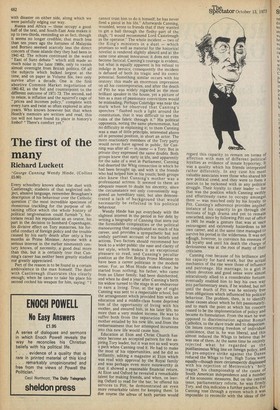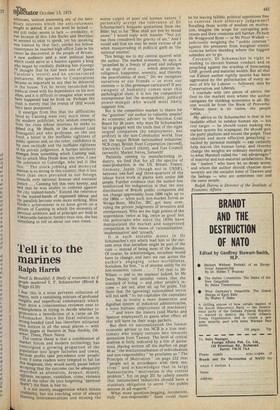The first of the many
Richard Luckett
'George Canning Wendy Hinde, (Collins 0.00)
Every schoolboy knows about the duel with Castlereagh; students of that neglected subject, abusive language, remember Brougham's description of his behaviour over the Catholic question (" the most incredible specimen of monstrous truckling for the purpose of obtaining office which the whole history of political tergiversation could furnish "); historians recall his reputation as an orator, his part in the decision to bombard Copenhagen, his divisive effect on Tory ministries, his forceful conduct of foreign policy and the trouble caused by his early death after only a few months as Prime Minister. Anyone with a serious interest in the earlier nineteenth century knows, of necessity, a good deal more than this, but it is certainly true that Canning's career has neither been greatly studied nor greatly appreciated.
Part of the reason is to be found in a certain ambivalence in the man himself. The duel with Castlereagh illustrates this clearly enough; when he came to take his place his second cocked his weapon for him, saying: "I cannot trust him to do it himself; he has never fired a pistol in his life." Afterwards Canning, wounded, wrote to friends that if they wanted to get a ball through the fleshy part of the thigh, "I would recommend Lord Castelreagh as the operator." The whole incident — two of the King's ministers in a duel — which promises so well as material for the historical novelist is rendered slightly absurd and at the same time almost innocuous; it does not even become farcical. Canning's courage is evident, but what is equally apparent is his refusal to indulge in heroics; consequently the incident is defused of both its tragic and its comic potential. Something similar occurs with his oratory: this made an enormous impression on all his contemporaries, and after the death of Pitt he was widely regarded as the most brilliant speaker in the house, yet a picture of him as a man of passionate convictions would be misleading. Perhaps Coleridge was near the mark when he observed that Canning's speeches "flashed such a light around the constitution, that it was difficult to see the ruins of the fabric through it." His political opponents, noting the same phenomenon, had no difficulty in explaining it; to them Canning was a man of little principle, interested above all in personal position, in short an actor. The more reactionary members of the Tory party would never have agreed in public, for Canning was after all — in.name — a Tory. But in private they expressed the same doubts. Both groups knew that eprly in life, and apparently for the sake of a seat in Parliament, Canning had deserted the Whig connection in which he had been brought up, and with it the friends who had helped him in his youth; both groups also knew that Canning's mother was a professional actress. It seemed to them an adequate reason to doubt his sincerity, since the circumstance not only conveniently suggested an hereditary taint, but also demonstrated a lack of background that would necessarily be reflected in his political behaviour.
Wendy Hinde has put everybody with the slightest interest in the period in her debt by writing a biography of Canning that sorts out the formidable complexities or the political manoeuvring that complicated so much of his career, and provides a sympathetic but not unduly partisan account of his beliefs and actions. Two factors should recommend her book to a wider public: the ease and clarity of her style, which makes it an exceptional pleasure to read, and Canning's peculiar position as the first British Prime Minister to have been a career politician in the modern sense. For, as Miss Hinde makes clear, he started from nothing; his father, who came from an Ulster family, had been disinherited, and when he died a year after Canning's birth his widow turned to the stage in an endeavour to earn a living. True, at the age of eight Canning was sent to a respectable school, but the arrangement which provided him with an education and a middle-class home deprived him of the opportunity of living with his mother, and ensured him, in his later life, no more than a very modest income. He was to suffer both from the separation from his mother entailed by his new life, and from the embarrassment that her attempted incursions into this new life would cause him.
Education at Eton and Christ Church has since become an accepted pattern for the aspiring Tory leader, but it was not so well worn a path when Canning trod it. He had to make the most of his opportunities, and he did so brilliantly, editing a magazine at Eton which was read with approval by the Royal family
• and was perhaps even more noteworthy in that it showed a reasonable financial return. At Eton and Oxford he revealed a remarkable talent for making friends, and when, on leaving Oxford to read for the bar, he offered his services to Pitt, he demonstrated an even more remarkable talent for keeping them. In due course the ultras of both parties would regard thiscapacity to remain on terms of affection with men of different political loyalties as evidence of innate hypocrisy. It was a quality which his friends interpreted rather differently. In any case his most valuable associates were those who shared his new political creed, and they were to form a caucus to be reckoned with in any political struggle. Their loyalty to their leader — for that was the position which Canning swiftly and effortlessly came to occupy amongst them — was matched only by his loyalty to Pitt. Canning's adherence provides another instance of his capacity to go through the motions of high drama and yet to remain unscathed, since by following Pitt out of office in 1801 he made a gesture that was at once extravagant and extremely hazardous to his own career, and at the same time managed to survive his period in the wilderness. It was not ertough, however, to convince his enemies of hit loyalty and until his death the charge of deviousness was at the root of many of their criticisms.
Canning rose because of his brilliance and his capacity for hard work, but the actual mechanics of the rise were those of influence and patronage. His marriage, to a girl in whom devotion and good sense were almost miraculously allied to a considerable fortune, eventually enabled him to buy his own waY into parliamentary seats, if he wished, but not until the death of Pitt was he entirely free from obligations which influenced his political behaviour. The problem, then, is to identifY those causes about which he felt passionately, and to mark the point at which his concern ceased to be the implementation of policy and became its formulation. From the start he was opposed to discrimination against Roman Catholics, to the slave trade and to despotism. On issues concerning freedom of individual
conscience, that is, he was liberal, and this almost induced the Whigs to believe that he was one of them. At the same time he entirelY rejected what he regarded as the pusillanimous Whig line on foreign policy, and his pre-emptive strike against the Danes reduced the Whigs to fury. High Tories were equally—though more circumspectly displeased with his rejection of Metternich's ' holY league,' his championship of the cause of South American independence and a number of his economic measures. But on the central issue, parliamentary reform, he was firmlY Tory, and this indicates a further paradox. For Canning rose through a system which it was impossible to reconcile with the ideas of the reformers, without possessing any of the hereditary interests which the anti-reformers sought to defend. If on one level he lacked — and still today seems to lack — credibility, it was because of this. Like Burke and Sheridan he seemed to exist to speak, yet his speaking was limited by that fact; unlike his fellow countrymen he reached high office. Late in his career he discovered, in the people of Britain, a new audience and a new political base Which could serve as a bastion against a king Who began by cordially disliking him (George IV thought that he had been one of Queen Caroline's lovers) and an unconvinced Parliament. His speeches to Corporations became as important as any that he delivered In the house. Yet he never reconciled. his Political creed with his dependence on his new allies, and it is difficult to imagine what would have happened had he lived on. Perhaps the truth is merely that the events of 1832 would have been postponed. It emerges from this that the difficulties faced by Canning were very much those of
the modern politician, who seldom emerges
from the class whose interests he seeks to
defend (e.g. Mr Heath, or the ci.devant Lord Stansgate) and who professes, on the one hand, a belief in the ineffable rightness of Public opinion and, on the other, confidence in his own rectitude and the ineffable rightness of his private judgement. A further similarity
emerges from something_ which Canning said, but to which Miss Hinde does not refer. I owe the reference to Coleridge, who put it like this: "The stock-jobbing and moneyed Interest is so strong in this country, that it has More than once prevailed in our foreign Councils over national honour and national Justice Canning felt this very keenly, and said that he was unable to contend against
the city trained-bands." Extend the reference to the trained-bands of organised labour and the parallels become even more striking. Miss
Hinde's achievement is to have given us a Picture of Canning in which the elements of Personal ambition and of principle are held in a believable balance; further than this, she has something to tell us about our own times.



































 Previous page
Previous page